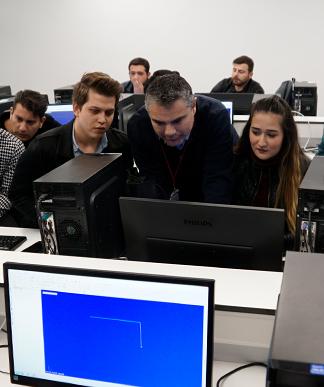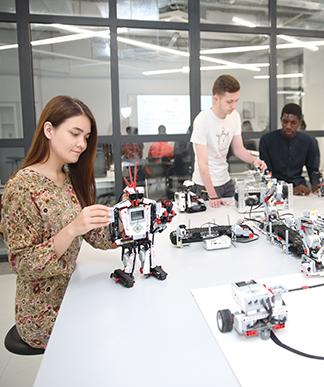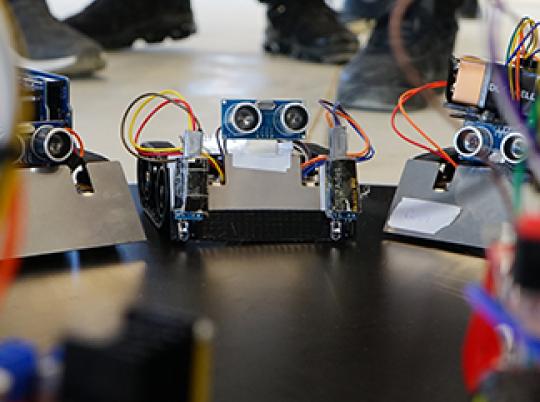


About the Program
Electrical and Electronic Engineering covers electrical plants, electronics, telecommunications, circuits and systems, electromagnetic fields, disciplines of microwave technology, robotics and control systems. Electrical Plants contain the design, operation, and maintenance of high-voltage devices, and also the design of various devices that belong to electricity generation and distribution systems; electronics, telecommunications, circuits and systems including the design, development, operation and maintenance of systems operating at low voltages. The electromagnetic fields and microwave techniques are involved in many systems that operate with high and low voltage devices. Control and robotic systems are mostly used to control high voltage devices by making use of the devices which operate at low voltage. Graduates are able to work in the telecommunications industry, alternative energy, and automation systems. The undergraduate program in Electrical and Electronics Engineering is offered in both English and Turkish.
Education Opportunities
Education and training activities in the Department of Electrical and Electronic Engineering are offered in laboratories equipped with state-of-the-art equipment and in classrooms with all the up-to-date technological facilities. There are eight faculty members who have completed postgraduate degrees in qualified and well-known universities. The faculty is composed of experienced academics who continue their scientific studies in their own fields of expertise, by supervising theses for postgraduate students. In addition to our two four-year undergraduate programs, there are Master of Science (M.S.) and Doctor of Philosophy (Ph.D.) programs focusing on academic research and development. Our undergraduates have the opportunity to specialize in fields, which are planned and offered based on today’s needs and expectations such as electrical plants, electronics, telecommunications, circuits and systems, electromagnetic fields, microwave technology, and robotic and control systems.

Accreditations
Electric-Electronic Engineering Program has been accredited by the Engineering Education Programs Evaluation and Accreditation Association (MÜDEK) in 2014, and has registered its place as a program with international quality standards. The program was also awarded the European Accredited Engineer Label EUR-ACE by MÜDEK.
Career Areas
Graduates of this department can work in big sectors, such as telecommunications, automation, and energy as engineers or in management in many fields of the industry. Graduates can also make major contributions to research and development in the R&D departments of a wide range of institutions and organizations. These include the Ministry of Energy and Natural Resources, electricity distribution companies, electricity transmission companies, construction companies, aerospace industries, automotive industry, scientific and technological research institutions, electronics and telecommunication design and manufacturing companies (e.g. Arçelik, Vestel Electronics, Beko, Turkcell, Aria, Huawei, and Ericsson).
In addition, our graduates can get a Free Engineer Consultant (SMM) authority as a member of the Electrical Engineers' Association (EMO), and they can easily carry out tasks specific to electrical engineering such as designing, implementing, testing, controlling, and signing.
Contact
Faculty of Engineering
Science and Technology Center, ST226
Tel: +90 392 671 1111 Extension: 2401
Faculty E-mail: secretary-fe@ciu.edu.tr
Head of Department: Prof. Dr. Mehmet KUŞAF
Head of Department E-mail: mkusaf@ciu.edu.tr
Compulsory Courses
First Semester
INTRODUCTION TO COMPUTING
Course code
CMPE101Credit
3Theoretical
2Practical
2Ects
5INTRODUCTION TO ELECTRICAL & ELECTRONIC ENGINEERING
Course code
EELE100Credit
0Theoretical
1Practical
0Ects
3READING AND WRITING SKILLS-I
Course code
ENGL141Credit
3Theoretical
2Practical
2Ects
4HISTORY OF CIVILIZATION
Course code
HIST100Credit
0Theoretical
2Practical
0Ects
2CALCULUS-I
Course code
MATH101Credit
3Theoretical
3Practical
1Ects
6LINEAR ALGEBRA
Course code
MATH121Credit
2Theoretical
2Practical
0Ects
4GENERAL PHYSICS-I
Course code
PHYS101Credit
4Theoretical
3Practical
2Ects
6MODERN TURKISH HISTORY
Course code
TARH100Credit
0Theoretical
2Practical
0Ects
2Second Semester
GENERAL CHEMISTRY
Course code
CHEM110Credit
4Theoretical
3Practical
2Ects
6INTRODUCTION TO PROGRAMMING
Course code
CMPE111Credit
4Theoretical
3Practical
2Ects
6READING AND WRITING SKILLS-II
Course code
ENGL142Credit
3Theoretical
2Practical
2Ects
4CALCULUS-II
Course code
MATH102Credit
3Theoretical
3Practical
1Ects
6GENERAL PHYSICS-II
Course code
PHYS102Credit
4Theoretical
3Practical
2Ects
6TURKISH LANGUAGE
Course code
TREG100Credit
0Theoretical
2Practical
0Ects
2TURKISH
Course code
TURK100Credit
0Theoretical
2Practical
0Ects
2Third Semester
CIRCUIT THEORY I
Course code
EELE211Credit
4Theoretical
3Practical
2Ects
6DIGITAL LOGIC DESIGN
Course code
EELE221Credit
4Theoretical
3Practical
2Ects
7DISCRETE MATHEMATICS
Course code
MATH122Credit
3Theoretical
3Practical
1Ects
5MATHEMATICAL METHODS FOR ENGINEERS
Course code
MATH202Credit
3Theoretical
3Practical
1Ects
6INTRODUCTION TO PROBABILITY AND STATISTICS
Course code
MATH205Credit
4Theoretical
4Practical
1Ects
6Fourth Semester
CIRCUIT THEORY II
Course code
EELE212Credit
4Theoretical
4Practical
1Ects
5ELECTRONIC PROPERTIES OF MATERIALS
Course code
EELE224Credit
3Theoretical
3Practical
0Ects
5ELECTROMAGNETIC THEORY I
Course code
EELE234Credit
3Theoretical
3Practical
1Ects
5ENGINEERING ECONOMY
Course code
INDE232Credit
3Theoretical
3Practical
0Ects
4DIFFERENTIAL EQUATIONS
Course code
MATH203Credit
3Theoretical
3Practical
1Ects
6UNIVERSITY ELECTIVE
Course code
UNIEXX1Credit
3Theoretical
3Practical
0Ects
5Fifth Semester
SIGNALS & SYSTEMS
Course code
EELE321Credit
4Theoretical
4Practical
1Ects
6LINEAR CONTROL SYSTEMS
Course code
EELE326Credit
4Theoretical
4Practical
1Ects
6ELECTROMAGNETIC THEORY II
Course code
EELE331Credit
3Theoretical
3Practical
1Ects
6ELECTRONICS I
Course code
EELE341Credit
4Theoretical
3Practical
2Ects
5ELECTROMECHANICAL ENERGY CONVERSION
Course code
ENRE305Credit
4Theoretical
3Practical
2Ects
5Sixth Semester
ELECTRONICS II
Course code
EELE342Credit
4Theoretical
3Practical
2Ects
6COMMUNICATION SYSTEMS
Course code
EELE362Credit
4Theoretical
4Practical
1Ects
5FREE ELECTIVE
Course code
FREEXX1Credit
3Theoretical
3Practical
0Ects
7FREE ELECTIVE
Course code
FREEXX2Credit
4Theoretical
3Practical
2Ects
7FREE ELECTIVE
Course code
FREEXX3Credit
3Theoretical
3Practical
0Ects
7Seventh Semester
SUMMER TRAINING
Course code
EELE300Credit
0Theoretical
0Practical
0Ects
5ROBOTICS
Course code
EELE411Credit
3Theoretical
3Practical
1Ects
4AREA ELECTIVE
Course code
EELEXX1Credit
3Theoretical
3Practical
0Ects
6PROJECT MANAGEMENT
Course code
ENGI401Credit
3Theoretical
3Practical
0Ects
5POWER TRANSMISSION AND DISTRIBUTION
Course code
ENRE401Credit
4Theoretical
4Practical
1Ects
4UNIVERSITY ELECTIVE
Course code
UNIEXX2Credit
3Theoretical
3Practical
0Ects
5Eighth Semester
AREA ELECTIVE
Course code
EELEXX2Credit
3Theoretical
3Practical
0Ects
6AREA ELECTIVE
Course code
EELEXX3Credit
3Theoretical
3Practical
0Ects
6AREA ELECTIVE
Course code
EELEXX4Credit
3Theoretical
3Practical
0Ects
6CAPSTONE PROJECT
Course code
ENGI402Credit
4Theoretical
2Practical
4Ects
8UNIVERSITY ELECTIVE
Course code
UNIEXX3Credit
3Theoretical
3Practical
0Ects
5Elective Courses
SOLAR ENERGY TECHNOLOGY
Course code
ENRE311Credit
3Theoretical
3Practical
0Ects
POWER SYSTEM PROTECTION
Course code
EELE416Credit
3Theoretical
3Practical
0Ects
ELECTRICAL MACHINERY
Course code
EELE453Credit
3Theoretical
3Practical
1Ects
6WIND ENERGY TECHNOLOGY
Course code
ENRE312Credit
3Theoretical
3Practical
0Ects
PROGRAMMING IN MATLAB FOR ENGINEERING
Course code
ENGI316Credit
3Theoretical
3Practical
0Ects
CONVENTIONAL AND ALTERNATIVE ENERGY RESOURCES
Course code
PNGE452Credit
3Theoretical
3Practical
0Ects
0ETHICS
Course code
INDE335Credit
3Theoretical
3Practical
0Ects
4DIGITAL SIGNAL PROCESSING
Course code
EELE420Credit
3Theoretical
3Practical
0Ects
ARTIFICIAL INTELLIGENCE
Course code
CMPE415Credit
3Theoretical
3Practical
1Ects
7INTRODUCTION TO MICROCONTROLLER PROGRAMMING
Course code
ELE328Credit
3Theoretical
3Practical
0Ects
0ENERGY SYSTEMS-I
Course code
ENRE303Credit
3Theoretical
3Practical
1Ects
5WORLD ENERGY POLITICS
Course code
PNGE451Credit
3Theoretical
3Practical
0Ects
0DIGITAL CONTROL SYSTEMS
Course code
EELE403Credit
3Theoretical
3Practical
1Ects
ENVIRONMENTAL IMPACT ASSESSMENT
Course code
ENVE402Credit
3Theoretical
3Practical
0Ects
IMAGE, VIDEO AND SPEECH CODING
Course code
EELE468Credit
3Theoretical
3Practical
0Ects
MANAGEMENT INFORMATION SYSTEMS
Course code
ISYE263Credit
3Theoretical
3Practical
0Ects
4SIGNAL AND IMAGE PROCESSING
Course code
CMPE326Credit
3Theoretical
3Practical
1Ects
6VISUAL PROGRAMMING
Course code
CMPE214Credit
3Theoretical
3Practical
1Ects
6ENERGY AUDITING
Course code
ENRE315Credit
3Theoretical
3Practical
0Ects
SURGICAL INSTRUMENTATION
Course code
MEDE402Credit
3Theoretical
3Practical
0Ects
FUNDAMENTALS OF COMPUTER NETWORKS
Course code
CMPE332Credit
4Theoretical
3Practical
2Ects
7COMPUTER AIDED DATA ANALYSIS
Course code
INDE491Credit
3Theoretical
3Practical
0Ects
ENERGY EFFICIENCY AND MANAGEMENT
Course code
ENRE313Credit
3Theoretical
3Practical
0Ects
5ENVIRONMENTAL MANAGEMENT
Course code
ENVE407Credit
3Theoretical
3Practical
0Ects
5CLOUD COMPUTING
Course code
CMPE481Credit
3Theoretical
3Practical
0Ects
MODELING AND SIMULATION
Course code
EELE246Credit
3Theoretical
3Practical
0Ects
INTRODUCTION TO CRYPTOGRAPHY AND NETWORK SECURITY
Course code
CMPE336Credit
3Theoretical
3Practical
0Ects
IOT FOR ENGINEERING
Course code
ENGI416Credit
3Theoretical
2Practical
2Ects
5BIOPROCESS ENGINEERING
Course code
BIOE308Credit
4Theoretical
3Practical
2Ects
7COMPUTER AIDED DESIGN
Course code
MCLE475Credit
3Theoretical
2Practical
3Ects
6SOIL AND GRD.WATER POLLUTION
Course code
ENVE427Credit
3Theoretical
3Practical
0Ects
DATA TRANSMISSION IN COMPUTER COMMUNICATIONS
Course code
CMPE331Credit
4Theoretical
3Practical
2Ects
4EASTERN MEDITERRANEAN ENERGY GEOPOLITICS
Course code
PNGE340Credit
3Theoretical
3Practical
0Ects
0POWER ELECTRONICS
Course code
EELE344Credit
3Theoretical
3Practical
1Ects
6ENGINEERING MANAGEMENT
Course code
INDE282Credit
3Theoretical
3Practical
0Ects
4MOBILE APPLICATION DEVELOPMENT
Course code
CMPE425Credit
3Theoretical
3Practical
0Ects
INTRODUCTION TO BIOMETRIC SYSTEMS
Course code
CMPE466Credit
3Theoretical
3Practical
0Ects
ADVANCED DIGITAL ELECTRONICS
Course code
EELE322Credit
3Theoretical
3Practical
1Ects
0NETWORK ANALYSIS
Course code
INDE301Credit
3Theoretical
3Practical
0Ects
EMBEDDED SYSTEMS
Course code
CMPE455Credit
3Theoretical
3Practical
0Ects
5MIDDLE EAST ENERGY OUTLOOK
Course code
PNGE415Credit
3Theoretical
3Practical
0Ects
5SOIL AND GROUNDWATER POLLUTION
Course code
ENVE427Credit
3Theoretical
3Practical
0Ects
BIOMEDICAL ENGINEERING AND INSTRUMENTATION
Course code
BIOE303Credit
3Theoretical
2Practical
2Ects
5COMPUTER SIMULATION
Course code
CMPE485Credit
3Theoretical
3Practical
0Ects
COMPUTER NETWORK DESIGN AND APPLICATIONS
Course code
CMPE431Credit
3Theoretical
2Practical
2Ects
7TOTAL QUALITY MANAGEMENT
Course code
INDE428Credit
3Theoretical
3Practical
0Ects
HAZARDOUS AND SPECIAL WASTE MANAGEMENT
Course code
ENVE431Credit
3Theoretical
3Practical
0Ects
5WELL LOGGING
Course code
PNGE350Credit
3Theoretical
3Practical
0Ects
6THERMAL POWER ENGINES
Course code
MCLE446Credit
3Theoretical
3Practical
0Ects
MICROPROCESSORS
Course code
EELE324Credit
4Theoretical
3Practical
2Ects
7SPECIAL TOPICS IN ENVIRONMENTAL ENGINEERING I
Course code
ENVE494Credit
3Theoretical
3Practical
0Ects
5ELECTROMAGNETIC THEORY I
Course code
EELE234Credit
3Theoretical
3Practical
1Ects
6ARTIFICIAL ORGANS
Course code
BIME404Credit
3Theoretical
3Practical
0Ects
Curriculum before 2024-25
Click here to see curriculum
TR Applicants
TR Students who are successful in the exams conducted by the Higher Education Council Student Selection and Placement Center (ÖSYM) and are entitled to enroll in our university in line with their preferences can complete the registration process with the necessary documents for registration from our Registration and Liaison Offices throughout Turkey or from the Marketing Directorate on campus.
Click for detailed admission requirements information.
TRNC Applicants
TRNC citizens and TR citizen candidate students who have completed their entire high school education in TRNC. They are placed in undergraduate programs in line with their success in the CIU Student Placement and Scholarship Ranking Exam and the programs they prefer.
Students who are successful in the exam can register from the TRNC Marketing Office.
Applicants can directly apply online to our undergraduate programs using the application portal. Please fill in your details correctly and upload all the required documents listed on the last page of the application form.
Required documents;
- Completed application form,
- Higher/Secondary Certificate or equivalents (e.g. O/A’Level, WAEC/NECO),
- Evidence of English Language competence: TOEFL (65 IBT) or IELTS (5.5). Students without these documents will take the CIU English proficiency exam on campus following arrival,
- Scanned copy of international passport/birth certificate,
- Fully completed and signed CIU Rules and Regulations document (which can be downloaded during the online application).
Cyprus International University provides academic scholarships for its students as an incentive for success, with most students benefiting from 50%, 75% or 100% scholarships or discounted tuition fees. Click for more information.
Tuition Fees are determined at the beginning of each academic year. Candidate students who are entitled to enroll in CIU can learn their fees in line with the Tuition Fee Calculation system.
Program Outcomes
The program outputs of Electrical and Electronic Engineering Program cover all knowledge, skills and behaviors necessary to achieve the educational objectives of the program:
PO1: Have adequate knowledge in mathematics, science and electrical-electronic engineering; use the theoretical and practical knowledge in complex engineering problems.
PO2: Have the ability to identify, define, formulate and solve complex electrical and electronic engineering problems; and be able to select and apply appropriate analysis and modeling methods.
PO3: Be able to design a complex system, device or product related to electrical and electronic engineering by applying modern design methods to meet specific requirements under realistic constraints and conditions.
PO4: Have the ability to develop, select and use necessary modern techniques and tools for the analysis and solution of complex problems encountered in electrical and electronics engineering practices; have the ability to use information technologies effectively.
PO5: Be able to design and conduct experiments to collect data, to analyze and interpret results, to examine complex electrical - electronics engineering problems or disciplinary research topics.
PO6: Have the ability to work effectively in disciplinary and multidisciplinary teams or individually.
PO7: Have the ability to communicate effectively in oral and written Turkish; knowledge of at least one foreign language; have the ability to write effective reports, to understand written reports, to prepare design and production reports, to make effective presentations, and to give clear and understandable instructions.
PO8: Be aware of the necessity of lifelong learning; have the ability to access information, to follow developments in science and technology and continuously update his/her knowledge and skills.
PO9: Act in accordance with ethical principles, professional and ethical responsibility; learn about the standards used in engineering practices.
PO10: Have information on business practices such as project management, risk management and change management; be aware of entrepreneurship and innovation; and learn about sustainable development.
PO11: Be informed about the effects of electrical and electronic engineering practices on health, environment and safety in the universal and social dimensions; know the legal consequences of engineering solutions.
Educational Goals
Educational goals of the undergraduate program of Electrical and Electronic Engineering, Cyprus International University, is to represent important achievements our graduates are expected to achieve shortly after graduation. Electrical and electronic engineers who graduate from this program are expected to perform one or more of the following educational goals:
EG1: Take part in national or international projects and organizations; and cooperate with professionals from different fields.
EG2: Develop professional and social norms to implement EEM applications that create added value.
EG3: Keep up-to-date and compete with colleagues by attending seminars, courses, certified training programs and symposia.
EG4: Carry out graduate studies or work in research and development (R&D) units of industrial organizations.